Immigration
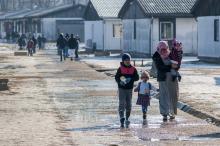
World Relief, a global humanitarian organization and one of the main non-governmental organizations involved in the U.S. refugee resettlement program, announced today that the organization is laying off at least 140 employees and shuttering five local offices "as a direct result of the recent decision by the Trump Administration to dramatically reduce the number of refugees resettled in the U.S. throughout fiscal year 2017."
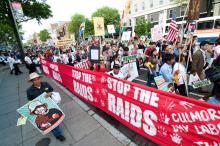
On Feb. 16 immigrants in Washington, D.C., plan to go on strike from work and other economic engagements, creating a “Day Without Immigrants,” just as immigrants in Wisconsin did on Feb. 13, reports the Washingtonian.
A flyer advertising the “Day Without Immigrants” calls for immigrants to avoid shopping, going to work, and eating at restaurants.

Receiving a prestigious human rights prize, an Iraqi lawmaker, who gained international attention for her oppressed Yazidi religious minority, decried the Trump administration’s “unfair” executive order on immigration.

While the ban remains inactive after the Ninth Circuit Court of Appeals denied the U.S. government’s request to resume travel restrictions, legal challenges by Trump’s administration will continue. Christians must join in solidarity with our refugee brothers and sisters and continue to denounce both the ideology and methodology of the ban.

This anti-Asian xenophobia is both individual and institutional in that it shapes our governmental policies. Although Japanese Americans as whole were unjustly incarcerated in World War II, an act deemed unconstitutional, Trump and his advisors employ historic internment as a rationale for detaining current minority groups.
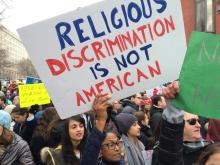
True, the executive order, which includes a restriction on travel to the U.S. for nationals of seven Muslim-majority nations for 90 days, does not directly refer to followers of Islam. But that doesn’t mean it’s not aimed at them, critics say.

President Donald Trump vowed to make good on a campaign promise to repeal the law that restricts political speech from the pulpit, speaking at his first National Prayer Breakfast as president.
“I will get rid of, totally destroy, the Johnson Amendment, and allow representatives of faith to speak freely and without fear,” he said on Feb. 2 to a gathering of 3,500 faith leaders, politicians, and other dignitaries from around the world, including King Abdullah of Jordan.
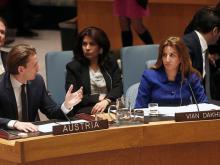
As the only female Yazidi in the Iraqi Parliament, Dakhil fought tirelessly for international assistance to stop the violence, including sexual slavery, targeting her beleaguered people.
Now she has been awarded the Lantos Human Rights Prize in Washington, D.C. But she is unlikely to make the ceremony on Feb. 8, since President Donald Trump banned all travelers from Iraq.
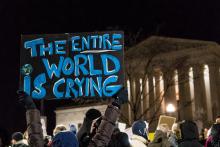
For Christians, in the 25th chapter of Matthew, Jesus makes clear that how we treat “the stranger” is how we treat him. That’s what the Gospel text says. And the “stranger” literally means immigrants and refugees — the citizens of other nations living and traveling among us. Therefore, this is a faith issue for us as Christians. Donald Trump’s executive order on “Protecting the Nation from Foreign Terrorist Entry into the United States” is in conflict with our Christian faith, and we will oppose it as a matter of faith.
1. What Will You Do if Donald Trump Deports Me?
“If you are an ally, a friend, or a decent human being who understands that immigrants and refugees work hard, play by the rules and are proud aspiring Americans, then read this guide.”
2. Here’s How Franklin Graham Justifies Trump’s Expected Refugee Ban
“It’s not a biblical command for the country to let everyone in who wants to come, that’s not a Bible issue.” :thinking:
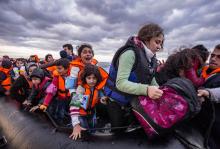
For the last few years Christians have been singing worship songs that include lyrics like “ keep my eyes above the waves, when oceans rise …” and yet have rejected refugees who’ve seen loved ones die beneath waves, who themselves have literally struggled to keep from drowning in oceans. Those American Christians — particularly white evangelicals — continue to sing the words: “Spirit lead me where my trust is without borders …” but fail to realize the shameful irony that they’re largely responsible for refusing shelter and opportunity to some of the world’s most helpless and oppressed people.

A Cincinnati area mosque announced it would join the burgeoning church sanctuary movement in the U.S., possibly becoming the first Islamic house of worship to do so.
The announcement came on the eve of the inauguration of President Donald J. Trump, who took a hard-line stance on immigration and proposed a national Muslim registry during his campaign.

Religion is increasingly viewed as highly politicized, not least due to the way that it is frequently covered in the news. Numerous studies have shown that news stories with emotional cues tend to both gain audience attention and prolong audience engagement.
It may therefore come as no surprise that online debates about religion are packed with emotional cues that evoke strong reactions from those who participate in them. This sets the stage for passionate online debates.
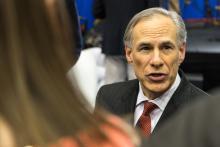
Currently there are an estimated 300 sanctuary states, counties, and cities across the U.S., but no model for sanctuary campuses. Calls for sanctuary campuses began in the wake of Donald Trump’s campaign pledges to repeal DACA and escalate deportations.

This idyllic immigrant story, that has become cliché in conversations of the “good” immigrant, shattered two weeks ago. I woke up to the fact that white America does not care about the well-being of my community. I woke up to the stench of white supremacy, which tells me that I will never be good enough to be fully American. I woke up in tears, because my dear friends who are undocumented immigrants, by no fault of their own, will suffer immensely under a Trump administration. I woke up longing to speak Spanish, to eat a whole Bandeja Paisa, and to feel what home feels like. I finally awoke to the reality that my brown body is a roadblock in white people’s project of making America great again.

Americans voted largely along the lines of race, education, and party identification. Nonwhites strongly preferred Clinton, while whites decisively chose Trump. Compared with past Republicans, the businessman received a stunning surge of votes from non-college-educated white voters.
None of this is surprising.
And yet the result upends so much conventional wisdom.
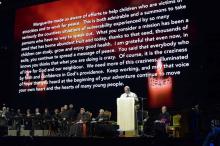
Even by this pope’s standards it was a bold move.
Francis, the spiritual leader of more than a billion Roman Catholics across the globe, this week traveled to Sweden, one of the most secularized countries in Europe, to take part in events marking 500 years since Martin Luther kickstarted the Protestant Reformation.
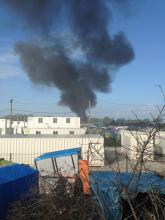
I am nervous for everyone. There is so much misinformation; the refugees of the Jungle and other camps like Isberg hear differing reports, which they then share among themselves. Tensions are growing because we, too, are given limited information, and can’t guarantee anything.
Would you trust someone who cannot give you any guarantees?

How can salvation be believed when we refuse to save refugees, or hope grasped when we deny it to immigrants, or justice pursued when we refuse it to the oppressed, or faith accepted when we don’t have faith in those different from us, or love known when we deny it to our neighbors, strangers, and even our enemies?

As an immigrant woman and a Christian, I’ve loved the book of Ruth ever since I realized Ruth was an immigrant, welcomed into the family of God. And I’ve often been surprised by the interpretations of the Biblical story, in which Boaz is the hero and no one else has any agency. I find this odd because, as I read Ruth, what I see is that Boaz did nothing more heroic than exactly what was required by God’s law: He welcomed an immigrant from a neighboring community.